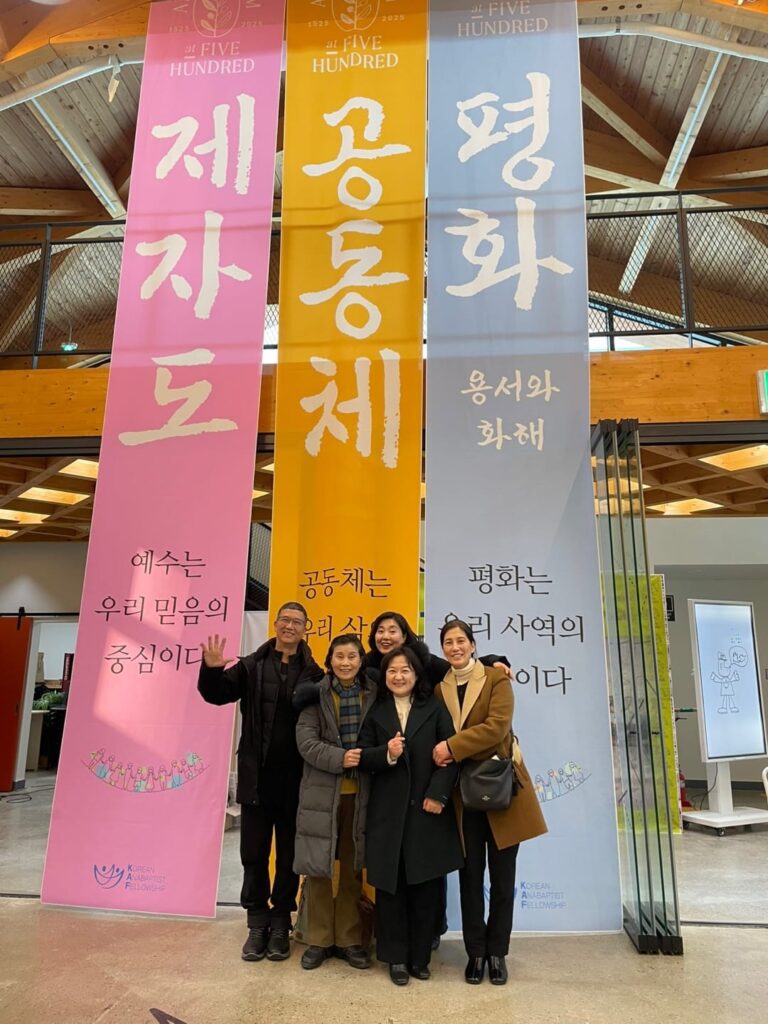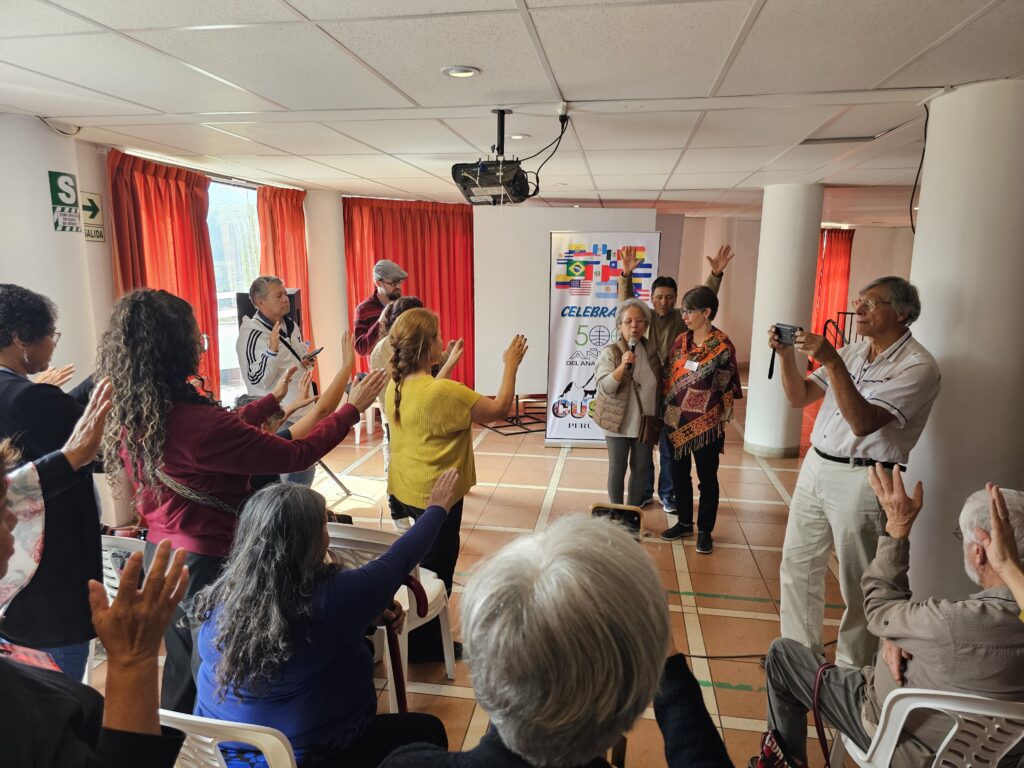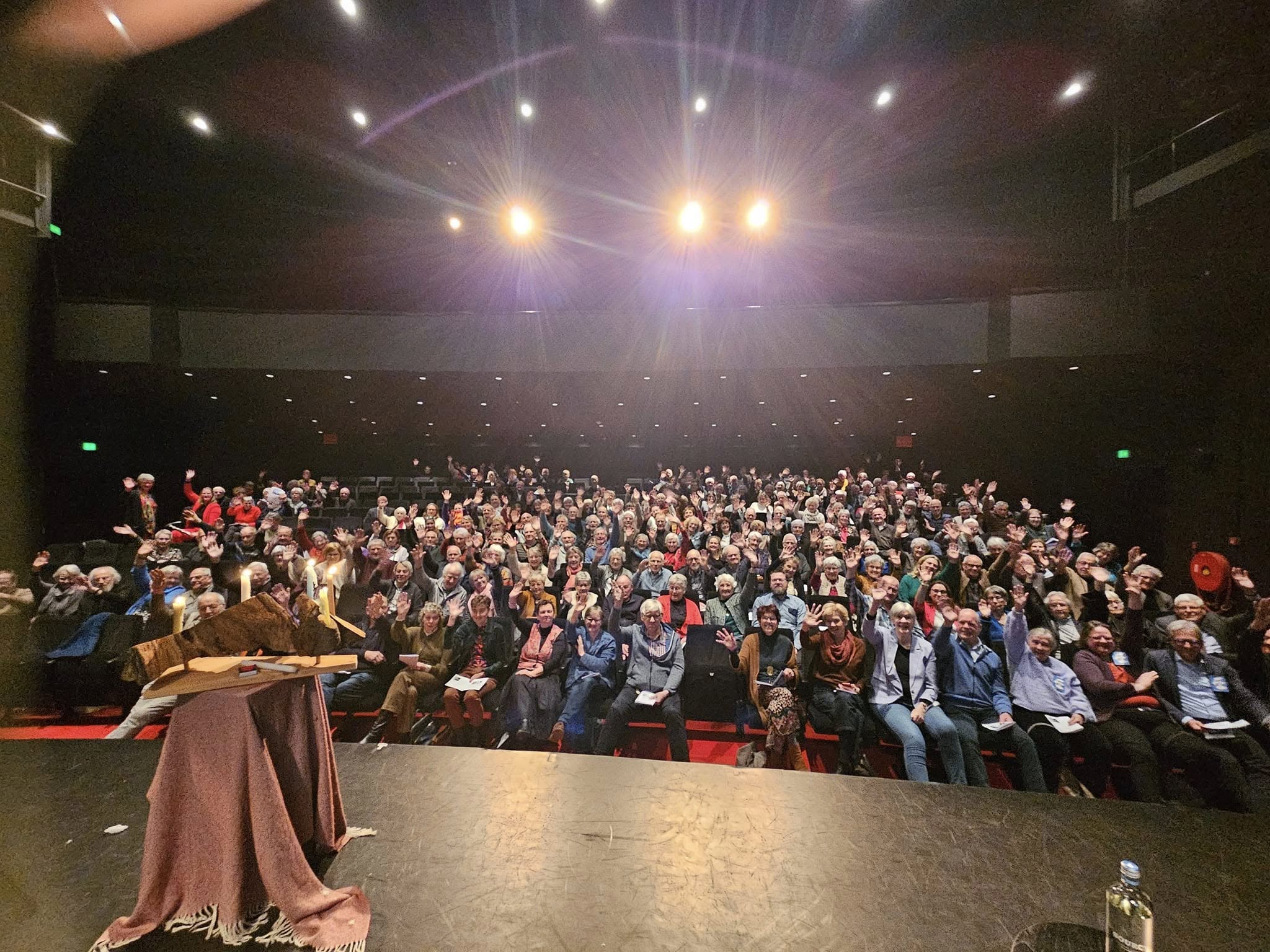Mennonite World Conference at 100
Some of us have a tendency of thinking that we should define right doctrine and from there go to practice. Scripture first; experience next. But in many ways – in our history and in our current reality – experience pushes us to think theologically to make sense of what is happening.
Consider the Council of Jerusalem. They were asking: Can we include Gentiles or not?
That was not clear in the Bible of their time.
The fact that Gentiles were receiving the Holy Spirit pushed the church to think in a new way – without contradicting the foundation that they had.
Their experience led them to raise the question to the Scripture and develop new understandings.
As Anabaptists, we have historically emphasized the local congregation and the centrality of the local congregation as the foretaste of God’s kingdom.
But that doesn’t help us to answer why there is a need of a regional or global church.
At the beginning of MWC, it was experience that pushed Mennonite churches to think about a global body.
Can you speak about similarity between today and some of the trends from 100 years ago when MWC started?
There was a global pandemic at that time. And many countries had just gone through the First World War. There is of course a financial impact which drives governments try to find scapegoat: who are we going to blame because of this? So that was an important component to the increase of nationalism in Europe.
And then our churches were also affected by the Russian Revolution and subsequent violent persecution in the area of Ukraine where we had a large concentration of our churches at that time.
So with the mix of nationalism, cultural differences, languages and both the recent and more distant past of violence between their countries, it was complicated for Mennonite church leaders in 1925 to think about being one.
Some people spiritualize the idea of unity, and say: We are going to be one on heaven.
Or say, Yes, we are fighting violently with each other, but we are one in spirit.
Both then and now, some churches think about other Christians with suspicion – even inside a denominational family.
But the Bible doesn’t speak in that way.
The Bible speaks of unity in a very practical way –visible even for the world. There is a level of unity that is a kind of miracle.
MWC founder Christian Neff and others were speaking and writing about the need for a global body for some time before 1925, but it was not easy to overcome lack of trust.
Finally, Christian Neff found a good excuse to bring people together: let’s celebrate the 400 years of the Anabaptist movement.
And it was in that context that the church from Ukraine sent a letter to the people in this first global Anabaptist gathering asking for the formation of a global body that would coordinate the work of education, mission and support churches that are under persecution and suffering, among other things.
When the church leaders gathered, the experience of being together opened up their eyes to the need of a communion to emphasize that the centre is not political nor a national state nor even a culture. The source of our identity is Jesus.
The context then was very similar to the context today after a pandemic, amid rising nationalism and experiences of suffering from violence and persecution.
It is interesting and sad at the same time to see how the history repeats.
What has changed is that that experience has invited us to think theologically. Do we want to be one only because of pragmatic issues? or because of our understanding of the gospel demands it?
What were some key moments where we leaned into becoming truly global?
To be a global family, we need some levels of reconciliation and forgiveness for our history of divisions.
We were not ready to think in that way 80 years ago.
At first, leaders said let’s have an Assembly only. And that was the way during the first 40 or 50 years.
But more and more churches from the Global South were becoming members. And churches that are under suffering see with more clarity the need of a global church. You cannot face violent persecution or natural disaster if you are alone.
By the 1970s, presidents were beginning to be appointed from the Global South. From the executive, C. J. Dyck said if we want MWC to continue, it should be more than a global gathering. It should be part of the mission Mennonites are being called to in this world, a place where they clarify the meaning of faith in their diverse cultural contexts.
That vision was the result, among other things, of input from Global South churches who were asking for more interdependency.
Pushed by those experiences, we have made theological developments of understanding the church as something that goes beyond the doors of my local congregation.
Are we where we should be?
I think we are going in a good direction, but we have theological challenges when we speak about the global church.
For many of the leaders and pastors in our global church, we are just starting to build a clear understanding of unity.
Too many times, our understanding of purity in our Anabaptist tradition has pushed us to fragment because we think to be holy or to be pure, we need to separate from those we deem are not.
Our history of divisions requires real reconciliation. There are some historic wounds that have not been healed and we continue to observe some divisions happening in real time.
The challenges of racism and colonialism are there. There’s a tendency to have some sectors of the church make decisions without consulting others and impose their points of view.

There are challenges of privileging our own interests over the interest of others. Of saying we need to protect our budget first before thinking about other churches.
In addition, we have ambition and the desire to control, dominate and conquer others.
The kingdoms of the world are very appealing to us. We love the sense of being superior to other groups.
But God invites us to live in contrast to the kingdoms of the world. God’s kingdom is a real alternative. We must recognize that we need the power of the Holy Spirit.
What do we mean by unity?
We must understand that unity doesn’t necessarily mean absence of conflict. True unity implies different fragments and different shapes coming together.
By definition, unity implies diversity, because if there is no diversity of opinions, culture, theology or experiences, then there is no need of speaking about unity because everyone believes the same. The opposite of unity is not diversity, it is uniformity.
And as a peace church, we know that the problem is not having conflict. The problem is how we navigate those conflicts.
It’s impossible to have a healthy relationship without conflict.
Today, many MWC churches are the result of a division from other churches. The fact that time has passed doesn’t change the reality that it was an internal division.
In MWC, we try to encourage churches to keep together as much as possible and not split.
However, sometimes separation is necessary because there is a level of disagreement that is not possible to solve because of the nature of our heart. God allows us some level of distance, and we can still be part of the global family if we respect our differences even though we don’t share a position about one topic.
That means the willingness to heal wounds. There must be intentional work in both sides to heal resentment, to avoid hating each other.
Here again, it is our experience that pushes us to think theologically about unity.
How is the theme The Courage to Love guiding us and shaping how we are thinking about this anniversary?
I think it is a crucial, relevant topic for today in this political world with so many people being bullied and bullying others.
There are many just causes, projects and demands. Many people say: We have the right to defend our land. We have the right to demand that these abusers stop their abuse.
But is there the possibility of doing something differently than asserting your rights?
I think Jesus invites us to another path.
To say “I want to put my rights aside and love” demands an unusual amount of courage.
It is not passive. It implies to have a very intentional, even assertive, way of responding that looks for the benefit of the other, that even looks for the well-being of the perpetrator.
The courage to love that our forebears discovered 500 years ago was not new. We see this invitation coming from God since the beginning of human history.
The courage to love also implies the dismantling of fear (1 John 4:18).
I perceive that many leaders act out of fear: fear of being contaminated, fear of being influenced, fear of change.
When there is perfect love, you can speak about any difficult topic without fear that you are going to lose something.
There is no fragmentation, ex-communion or mutual condemnation, but there is respect for strong convictions.
As Augustine of Hippo said, a definition of sin is to be self-centred. So love is the opposite of that.
When you love, you are opening yourself to others and there is no room for fear.
One part of MWC’s mission is to relate with other communions. How has that experience shaped you?
If you don’t relate to other Christians, then you may end up having a very narrow idea of what the Christian church is.
By being a global body in MWC, we have the capacity to represent ourselves as an entity with other churches.
When you have clear identity and when you live out your values, experiences with other churches can be immensely rich and transformative. Then you can learn from others and also share your values.
That doesn’t mean that is easy. For example, at the Conference of Secretaries of Christian World Communions, there are a total of 21 global entities represented. And as you can imagine the diversity is huge. For some, there is a complicated past of persecution and mutual condemnations. And with other groups, there is not even a relationship.
And of course, the understanding of these churches about many things such as leadership and hierarchy are very different.
So, it was a challenge to think about how to represent MWC. How should I react to challenges? There are meetings when the topics are so controversial that the discussions get very strong.
But with the passage of the time, I began to see how the challenges of one communion are very similar to the challenges of another communion.
And then relationships started to go deeper. That helped me to value people above doctrines or doctrinal differences.
I remember a meeting where there were several general secretaries around a meal.
And one of them said to another, Knowing you, I find myself thinking in such similar ways to you that I would be OK being part of your church and the other replied, I could also be a member of your church.
So those experiences shape your way of understanding Scripture and transform you on the way.

How can MWC faithfully evolve into a strong and revived communion that is resilient to the challenges of the future that may look very different?
I would say that if we keep going in the same track, we will be resilient:
- build a global communion,
- seek interdependency,
- make decisions by consensus,
- consult one another,
- have good leadership,
- keep in a good relationship with each other in the Anabaptist family,
- build good relationships with other global communions, heal memories internally and externally.
But of course, we also need the courage to recognize our own weaknesses.
Sometimes we have a triumphalistic approach to mission and church planting, service and social development, our impact with business and peace making.
Of course, it’s good to recognise the work that we have done. But it is also good to recognize all the weaknesses that we have.
To realise how much work we duplicate in church planting, how much colonialism has pervaded our work, how much paternalism is still there in our mission agencies.
How much good we have done with our service and at the same time, how many people we have wounded in that process.
It is also crucial to look at ourselves with humility and see how small we are alongside other global communions.
So to be a resilient, hope-filled church for the future, we must recognize the areas that we need to work on.
A strong communion is one that is capable of speaking about our differences with love.
Love gives us the open heartedness and courage to do difficult things.
“The courage to love”: Love gives us the open-heartedness and courage to do difficult things.
General Secretary of Mennonite World Conference since 2012, Colombian Canadian Mennonite César García spoke with Courier editor Karla Braun about MWC at 100 and The Courage to Love. This interview has been edited for length and clarity.
